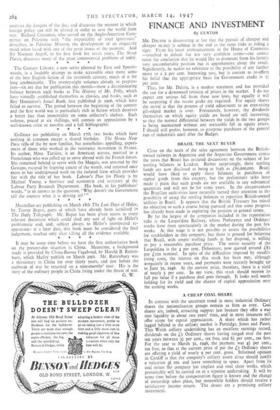FINANCE AND INVESTMENT
By CUSTOS
MR. DALTON is discovering at last that the pursuit of cheaper and cheaper money is subject in the end to the same risks as riding a tiger. From his latest pronouncement in the House of Commons —couched in defiant but not very confident terms—one cannot resist the conclusion that he would like to dismount from his latterly very uncomfortable position but is apprehensive about the result. Significantly, he makes no reference to the possibility of any further move to a 2 per cent. borrowing rate, but is content to re-affirm his belief that the appropriate basis for Government credit is 21 per cent.
That, for Mr. Dalton, is a modest statement and has provided the cue for a downward revisionof prices in the market. I do not expect any serious fall from these new lows, but equally it will be surprising if the recent peaks are regained. For equity shares the moral is that the process of yield adjustment to an ever-rising gilt-edged market is over. Fortunately, however, the dividends themselves on which equity yields are based are still increasing, so that the normal differential between the yields in the two groups is being maintained without any noticeable fall in equity prices. I should still prefer, however, to postpone purchases of the general run of industrials until after the Budget.
BRAZIL THE NEXT BUYER Close on the heels of the sales agreement between the British- owned railways in Argentina and the Argentine Government comes the news that Brazil has initiated discussions on the subject of her sterling balances in London. Rather surprisingly, these sterling funds are now disclosed as being as high as £65,000,000. Brazil would have liked to apply these balances in purchases of capital goods from this country, but the preliminary talks have made it plain that such goods are not available in any substantial quantities and will not be for some years. In the circumstances the Brazilian authorities have naturally turned their attention to the possibility of using the sterling balances to repatriate British-owned utilities in Brazil. It appears that the British Treasury has raised no objection to such a course being pursued and that some progress has already been made in exploring the position in general terms.
By far the largest of the companies included in the repatriation talks is the Leopoldina Railway, whose Preference and Ordinary stocks have risen spectacularly in the market during the past few weeks. At this stage it is not possible to assess the possibilities for stockholders in this company, but there is ground for believing that Brazil, with ample' sterling funds at her disposal, is willing to pay a reasonable purchase price. The senior security of the Leopoldina is the 4 per cent. Debenture, now quoted around £.83 per £roo nominal. In spite of the difficulties imposed by steadily rising costs, the interest on this stock has been met, although irregularly in recent years, and payments were recently brought up to June 30, 1946. At the current price, therefore, there is a yield of nearly 5 per cent. In my view, this stock should receive its full par value if a purchase deal goes through. It looks well worth holding for its yield and the chance of capital appreciation over the coming weeks.
• A CHEAP COAL SHARE
In contrast with the uncertain trend in most industrial Ordinary shares the nationalisation groups remain as firm as ever. Coal shares are, indeed, attracting support just because they offer a way into- liquidity in about two years' time, and in most instances still offer scope for capital appreciation. A share which has rather lagged behind in the colliery market is Partridge, Jones and Paton. This Welsh colliery undertaking has an excellent earnings record, dividends on the £i Ordinary shares having ranged over the past ten years between 31 per cent., tax free, and 64 per cent., tax free. For the year to March 31, 1946, the payment was 44 per cent., tax free, so that at the current price of par the Li Ordinary shares are offering a yield of nearly 9 per cent. gross. Informed opinion in Cardiff is that the company's colliery assets alone should justify a valuation sf zos. and leave something to spare. Apart from its coal mines the company has tinplate and steel sheet works, which presumably will be carried on as a separate undertaking. It will be some time before the compensation figure is known and the change of ownership takes place, but meanwhile holders should receive a satisfactory income return. The shares are a promising colliery investment.


































 Previous page
Previous page